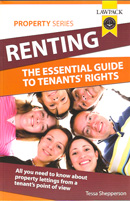I have finally laid my hands upon a copy of the new book by Tessa Shepperson, the maestro of Landlord law blog and old friend of this blog. The book has been out since early summer, so apologies to Tessa for my belatedness.
 Given this intro, I can hardly pretend to a fully objective review. But ‘Renting: The Essential Guide to Tenants’ Rights‘[1] is certainly well worth noting here, (despite the – let’s be honest – not wonderful cover design, for which clearly Tessa is in no way responsible).
Given this intro, I can hardly pretend to a fully objective review. But ‘Renting: The Essential Guide to Tenants’ Rights‘[1] is certainly well worth noting here, (despite the – let’s be honest – not wonderful cover design, for which clearly Tessa is in no way responsible).
It is important that this is not a specialist’s text. Tessa has set out to produce a clear, comprehensible and useful guide to becoming, being and stopping being a tenant, what rights one has as a tenant and what can be done to exercise and protect those rights. The tenant is the reader.
As anyone working in housing law will know, tenants and, all too often, landlords are ignorant of the actual rights, obligations and liabilities that are involved, as most of these are statutory and rarely set out in tenancy agreements or the like. Giving a clear account of what is involved is very difficult and tends to be laden with caveats, digressions and qualifications. So I am very impressed that Tessa’s book manages to organise the main and significant points of current (as of 01/07/07) tenancy law in a way which is marvellously straightforward and practical.
At an early stage, the reader is guided through identifying what kind of tenancy they have. After that, the approach is to describe specific rights. E.g. Right to be treated fairly, Right regarding condition of the property and repairs, Right to have your deposit returned, Right to live in the property undisturbed. This works very well, enabling distinct areas of the law to be brought together under the kinds of concern that the tenant may have.
The difference between the law affecting different kinds of tenancy is made clear, with separate sections where required, all following from the reader’s initial identification of their tenancy type. The three main current forms of tenancy: shorthold assured; assured, and secure, receive detailed consideration where they differ from each other. Other older or rarer forms of tenancy are also addressed, as are student lets and the particular issues of HMOs.
The book is also clear about where the law is especially complex or where the situation requires specialist advice (e.g. tolerated trespassers). The reader is advised to seek help and, in a separate section, informed how to find help, how to work with their advisor and importantly, how to avoid unnecessary expense and dodgy ‘advisors’.
In the full realisation that this book might do my firm out of some private client fees, I recommend it highly to all tenants or tenants to be. It will be of great help in avoiding problems and knowing what the options are when problems arise. I would also recommend it to general, non-housing specialist, welfare advisors – in an advice agency, for instance – and to landlords, as their right, duties and liabilities are also clearly laid out.
It is also astonishingly cheap – well beyond a bargain. Buy one for every tenant you know!
[1] The link is to Amazon.co.uk, but for clarity, I am not getting any referral payments.
Good review. Tessa should see about a student discount – it might be popular with university student unions and their housing departments.
It would certainly be useful for them.
Thank you for such a nice review. The book took a lot of thought and I tried to organise it in a non traditional but user friendly way. I am glad you think it worked.
As regards student discounts, this is not my department but Lawpacks. I just wrote the book, they are the publishers. However I doubt that you will get a better price than that on Amazon which I think is about £6.50.
Seems like a bargain to me, although I would note two things:
1) Publishers normally listen to their authors, as long as they think it’s a good idea.
2) The actual size of the discount is largely irrelevant; students, I think, like to see a big red sticker that shouts, “student discount!” when they buy something. There are probably enough students that read this blog, however, that they can make this point (if it is right) on their own account.
As the reviewer stated, ‘the tenant is the reader’ of this book. The design brief was to appeal to the younger student market whilst avoiding the usual design clichés (keys, letting boards etc). What is rather a dry subject has had a bit of fun injected into it by way of a more upbeat cover, which the buyers at WHSmiths and Waterstones liked.
Richard Pierce
Designer
Lawpack Publishing
Richard
Thanks for the comment, and I’m sure you fulfilled your brief. I’m not sure that I’d see the student market as the sole or even the main target market, but that’s the publisher’s decision, I suppose.
You are quite free to ignore me as a crusty old ex- art critic with a hatred of stock photography and a side interest in discrimination law. If it is any consolation, I like the diagonals.
It is, of course, right that anything with stock images of keys or letting boards would have been significantly worse, and if it helps sell Tessa’s book, great.
Nearly Legal